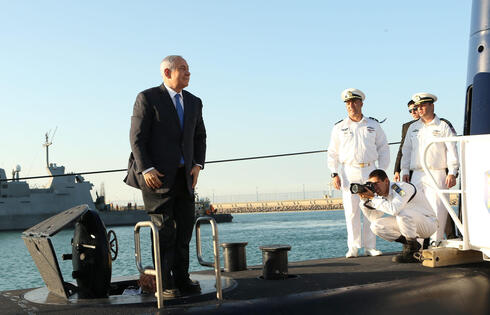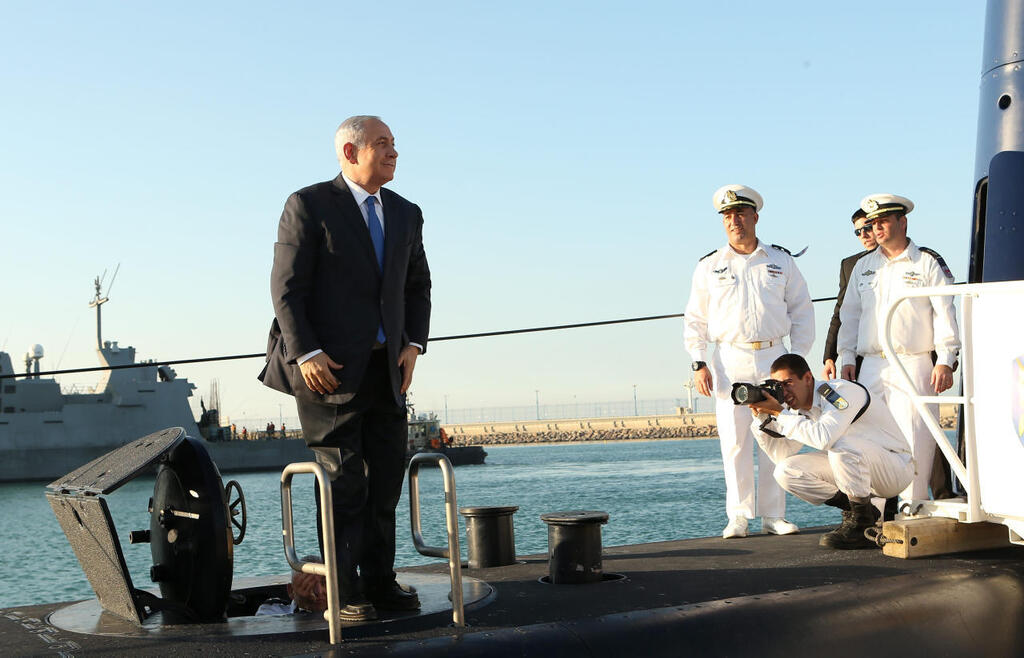
Submarine-gate commission: Netanyahu "endangered the security of Israel and harmed its economic interests"
The commission sent five warning notices to parties who may be harmed by the investigation into the purchase of submarines from Germany. Besides Netanyahu, former Defense Minister Moshe Ya'alon, former Mossad head Yossi Cohen, former Navy Commander Ram Rothberg, and Avner Simchoni, who worked at the Mossad, also received warnings.
The state commission of inquiry to investigate the submarine affair, headed by retired Supreme Court President Asher Grunis, sent five warning notices to parties who may be harmed by the investigation, led by Prime Minister Benjamin Netanyahu. Also on the list of those warned are the former Minister of Defense Moshe "Bogie" Ya'alon, the former head of the Mossad, Yossi Cohen, the former commander of the Navy, Ram Rothberg, and former National Security Council employee Avner Simchoni.
Regarding Netanyahu, it is written that he "may be harmed if the commission reaches a conclusion that in his position as Prime Minister, in the years 2009-2016, on issues investigated by the commission, he made decisions that had significant implications for the security of the state and the building of the power of the IDF, without an orderly decision-making process."
The commission listed a number of alleged faults by the Prime Minister: "He reached conclusions with Germany on a series of political, security, and economic issues without documentation and while bypassing the government; made the Mossad an executive body of the Prime Minister, which acted simultaneously and in contradiction to the Ministry of Defense in the areas of responsibility and expertise of the Ministry of Defense; led to the purchase of a sixth submarine on the basis of unfounded assumptions, changing justifications, without orderly staff work, and deviating from the operational needs established by the government; avoided discussing the resulting consequences from the allocation of huge budgets for equipping a sixth submarine to the IDF's readiness for security challenges in the short and long term, which were presented to him."
Israel purchased the submarines and vessels from German shipbuilder Thyssenkrupp in a deal valued at $2 billion.
The commission also claims that Netanyahu allegedly "tried to promote further increases in the submarine fleet, not on the basis of headquarters work and in extreme deviation from the operational needs established by the government; he promoted the replacement of old submarines with new ones and pushed the security establishment away from dealing with an issue within its areas of responsibility. This, while causing disruption of a professional and orderly process which was conducted in the defense system and which dealt with the timing of the replacement of the old submarines with the new ones, the characterization of the new submarines and the determination of their price; he promoted the purchase of two additional Sa'ar 6 assault ships (to be used as anti-submarine vessels) from Germany without the involvement of the defense system, which is the responsibility of the defense system, without a discussion of the need and without an orderly report and documentation of his actions to promote the procurement (the move was stopped)."
The commission adds that Netanyahu allegedly "made decisions on sensitive security-policy questions without regular examination and while excluding relevant security factors; he avoided documenting meetings in a way that negated the ability to control and monitor the execution of decisions of strategic importance to the security of the state; he created parallel and contradictory channels of action, thereby resulting in a security risk to the state and damage to the foreign relations of the State of Israel; he hid from relevant parties the political discourse he conducted even though he was warned about the consequences of the discourse on the handling of the issue."
The commission concludes: "Mr. Netanyahu's conduct in the issues investigated by the commission led to a deep and systematic disruption of work processes and the building of power and damage to decision-making mechanisms on a series of sensitive issues. In doing so, he endangered the security of the state and harmed the foreign relations and economic interests of the State of Israel."
The investigative commission was established following the government's decision in January 2022, headed by Naftali Bennett, and its members were appointed a month later. According to the commission's statement, it examined tens of thousands of documents, held background interviews, and collected testimonies from individuals who were involved, the last of which took place at the end of May.
Among others, prime ministers, defense ministers, chiefs of staff, director generals of defense ministries, military secretaries to the prime minister, navy commanders, and senior officials in the defense system testified before the commission. The commission heard 41 witnesses and 122 interviewees. The testimonies were heard behind closed doors due to their dealing with classified issues.
The commission investigated decision-making processes on procurement matters relating to the building of Israel's military force, including the procurement of Sa'ar 6 ships, the procurement of submarines, the procurement of anti-submarine ships, the privatization of naval shipyards, and the agreement to sell submarines from Germany to a third party.
On behalf of the Prime Minister, it was stated in response: "Prime Minister Netanyahu states that the submarines are a central element in Israel's national security and in ensuring its existence against Iran, which is trying to destroy us. The purchase of the submarines and the vessels not only did not harm the security of the state - it guarantees its existence. History will prove that in this matter too, Prime Minister Netanyahu was right and made the right decisions for Israel's security."















